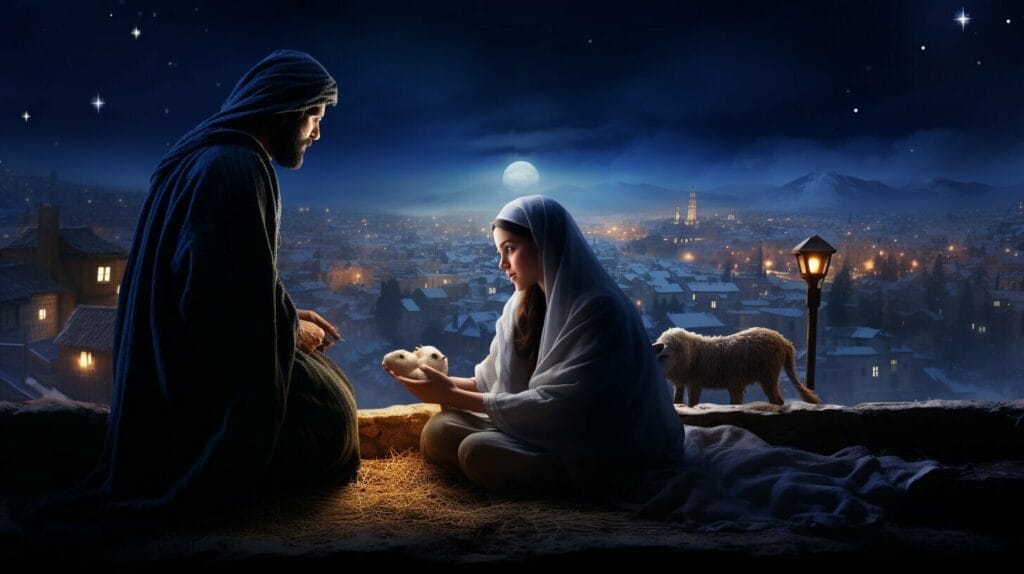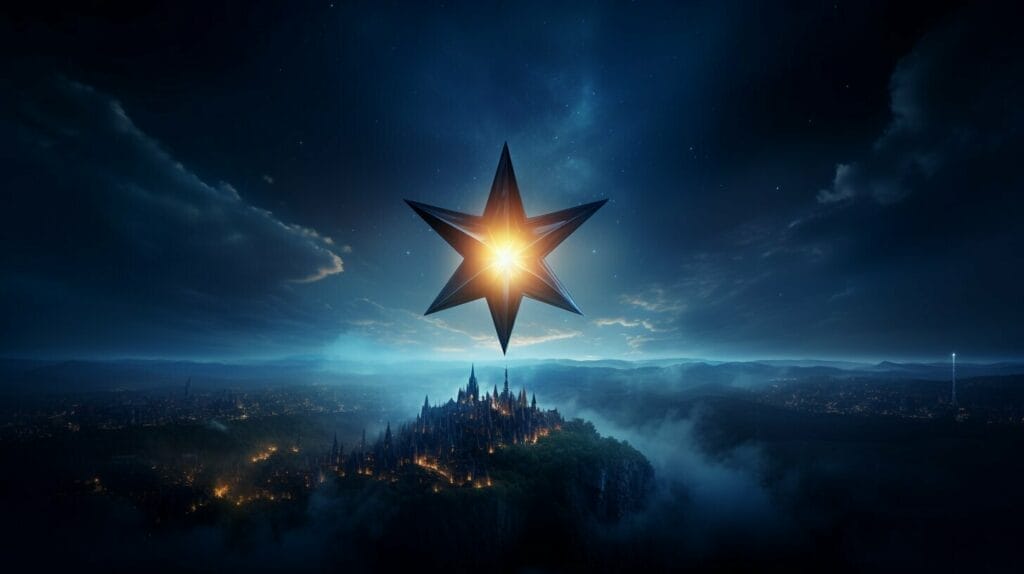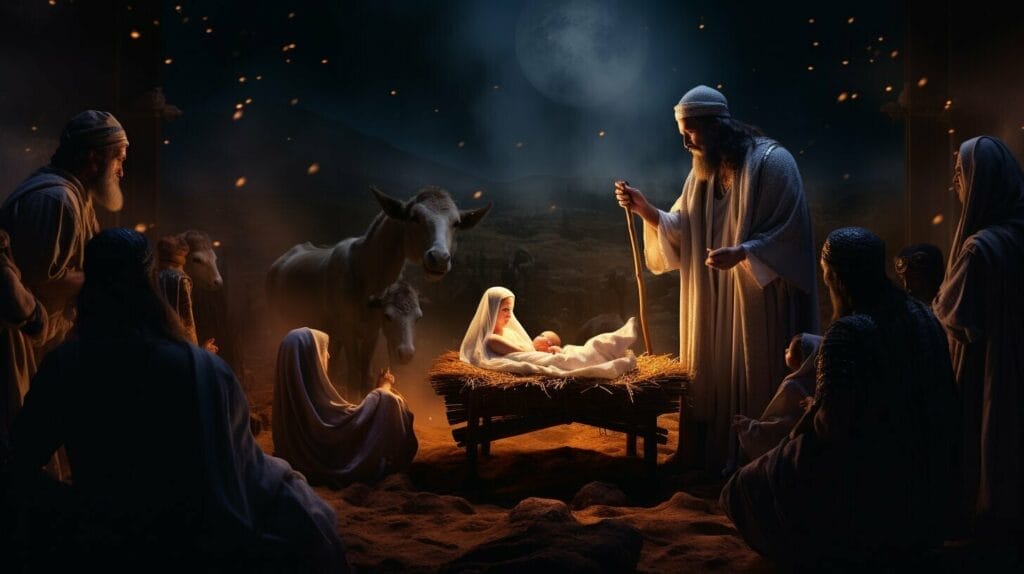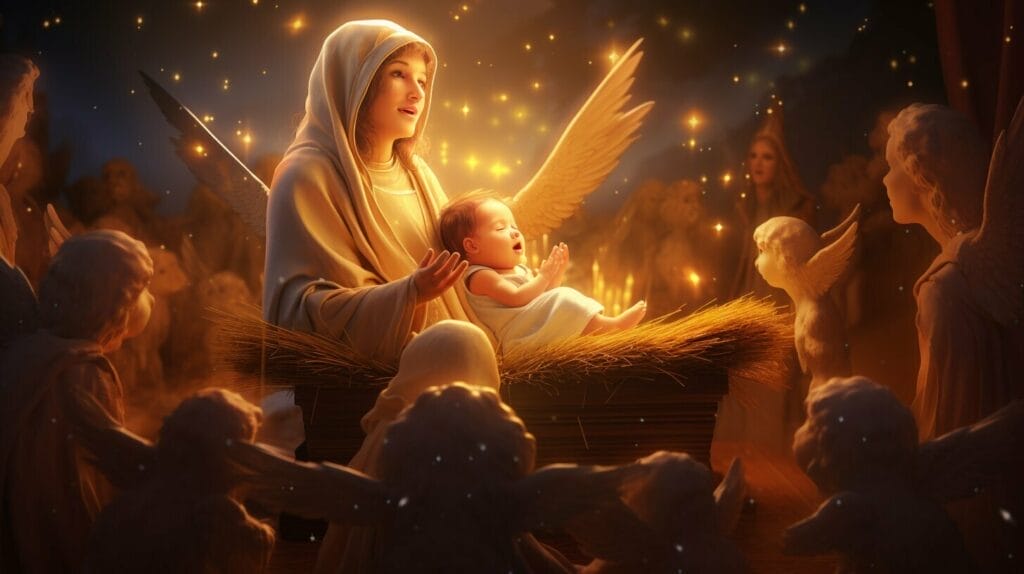What Does Christmas Celebrate? Discovering the True Spirit of Christmas
Christmas is the most wonderful time of the year! It’s a time for celebration, love, and joy. But have you ever wondered what Christmas really means and why we celebrate it? In this section, we will explore the true meaning and significance of Christmas. We will explore the rich history and Christmas traditions associated with this joyous holiday, uncovering its deep-rooted connections to Jesus’ birth, the Nativity, and the cherished Christmas story.

The true spirit of Christmas is all about giving, love, and kindness toward others. It is a time when families come together to share special moments, exchange gifts, and create lasting memories. However, the origins of Christmas go much deeper than just exchanging presents.
Christmas celebrates the birth of Jesus Christ, the Son of God, who came into the world to save humanity from sin and death. More than just a holiday, Christmas is a sacred observance that carries immense theological significance for Christians around the world.
Key Takeaways:
- Christmas celebrates the birth of Jesus Christ, the Son of God.
- The true spirit of Christmas is all about giving, love, and kindness toward others.
- Christmas has deep-rooted connections to Jesus’ birth, the Nativity, and the cherished Christmas story.
- Christmas is a sacred observance that carries immense theological significance for Christians around the world.
- Christmas is a time for families to come together to share special moments, exchange gifts, and create lasting memories.
The Birth of Jesus: A Divine Miracle
Welcome to the heart of the Christmas story! The Nativity of Jesus Christ is the cornerstone of this festive season, and it is a beautiful story that has been retold for generations in the Gospel of Luke and Matthew. The story begins with Joseph and Mary, who were engaged to be married when Mary was visited by an angel and told that she would give birth to a son who would be the Savior of the world.
Joseph and Mary traveled to Bethlehem, where Jesus was born in a humble manger. This is where we get the term “Nativity,” which refers to the birth of Jesus. The story is told in the Gospels of Luke and Matthew, and it includes many miraculous events.
The Gospel of Luke tells of angels who appeared to shepherds in a nearby field, announcing the good news of Jesus’ birth. The shepherds then went to see the baby and spread the word about the miraculous event.
In the Gospel of Matthew, we learn that after Jesus was born, wise men from the East came to Jerusalem, seeking the newborn King that they had seen a star in the sky, which led them to Bethlehem. They found the baby Jesus and presented him with gifts of gold, frankincense, and myrrh.

The birth of Jesus is commemorated in many ways, including through the tradition of setting up Nativity scenes, where figurines and statues depict the story of the Christ’s Mass. The tradition of setting up a Nativity scene began in Italy in the 13th century, and it has since spread throughout the world.
The Christ’s Mass is the Christian celebration of Jesus’ birth, and it is held on December 25th. It is one of the most important days in the Christian calendar, and it is celebrated with Midnight Mass, where the Christmas Gospel is read.
The story of the Nativity reminds us of the humble beginnings of Jesus, who came into the world in a manger and was visited by shepherds and wise men. It is a story of hope, love, and redemption that has inspired people around the world for centuries.
The Star of Bethlehem: Guiding the Way
One of the most iconic symbols of Christmas is the Star of Bethlehem, which guided the Three Wise Men on their journey to locate the infant Jesus. The Star has been the subject of much speculation and fascination over the years, with many theories and interpretations proposed as to its true nature and significance.
According to the biblical account, the Star of Bethlehem appeared in the sky shortly before the birth of Jesus, indicating to the Wise Men that a great event had transpired. The Wise Men, also known as the Magi, were scholars and astrologers from the East who were renowned for their knowledge of the stars and prophecies. They followed the Star to Bethlehem, where they presented gifts of Frankincense, Myrrh, and Gold to the newborn Savior.

Although the exact nature of the Star of Bethlehem remains a mystery, it is speculated that it may have been a rare astronomical event, such as a conjunction of planets or a supernova. Some scholars also suggest that it may have been a miraculous sign from God, specifically designed to guide the Wise Men to the birthplace of Jesus.
Despite the different interpretations, the story of the Star of Bethlehem remains a powerful symbol of hope, faith, and guidance. It reminds us that even in the darkest of nights, there is always a guiding light that can lead us towards our destination. Just as the Wise Men followed the Star to find Jesus, we too can find meaning and purpose by following our own guiding light.
Gifts of the Magi
The gifts of Frankincense, Myrrh, and Gold presented by the Wise Men to Jesus have their own symbolism and meaning. Frankincense is a fragrant resin that was used in ancient times for medicinal and religious purposes. Its gift to Jesus symbolized his divinity and role as a priest. Myrrh, also a resin, was used for embalming and had symbolic associations with death and sacrifice. Its gift to Jesus foreshadowed his death and sacrifice as the Savior of mankind. Gold, a precious metal, was associated with royalty and wealth. Its gift to Jesus acknowledged his kingship and sovereignty over all creation.
King Herod
The arrival of the Wise Men and their inquiry into the birth of a new king provoked the jealousy and fear of King Herod, who feared that his own throne was in danger. Herod ordered the Wise Men to return to him with news of the baby’s whereabouts, but they were warned in a dream not to do so. Herod then ordered the slaughter of all male infants in Bethlehem, hoping to eliminate the newborn king. However, Jesus and his family were warned about Herod’s plan and escaped to Egypt, fulfilling the prophetic words: “Out of Egypt I called my son” (Hosea 11:1).
The story of the Star of Bethlehem and the Wise Men is a powerful reminder of the significance of Jesus’ birth and the impact it had on the world. Their journey symbolizes the search for truth and the quest for spiritual enlightenment that we all embark upon in our own lives.
Christmas Eve and Yuletide Traditions
Christmas Eve is a magical time of year, full of cherished traditions that have been passed down from generation to generation. From family gatherings to festive feasts, this holiday is celebrated across the world with different customs and rituals that have become an integral part of the Yuletide season.
One of the most popular traditions on Christmas Eve is the exchange of gifts. Many families open their presents on the night of December 24th, while others wait until Christmas morning. Whatever your preference, the act of giving and receiving gifts is a time-honored tradition that symbolizes the love and warmth shared among family and friends.
Another beloved custom is the Christmas Eve feast. Families gather around the table to enjoy a lavish spread of traditional holiday dishes, from succulent turkey and ham to indulgent desserts like Christmas pudding and fruitcake. This is a time to savor the flavors of the season and share in the joy of each other’s company.
But beyond these specific traditions, the overarching theme of Christmas Eve is one of celebration and togetherness. It is a time to reflect on the past year and look forward to the future with hope and optimism. Whether you attend midnight Mass, sing carols with family and friends, or simply enjoy a quiet evening at home, the spirit of Christmas Eve is a powerful reminder of the true meaning of the holiday.

And of course, the celebrations of Christmas Eve continue on into December 25th, with more traditions and customs that make this holiday so special. From decorating the Christmas tree to baking festive treats, this day is full of activities that bring families and friends together in joyful celebration.
No matter how you choose to celebrate, the traditions of Christmas Eve and Yuletide are a testament to the enduring spirit of the holiday season. So, gather with your loved ones, savor the flavors of the season, and enjoy all the warmth and wonder that this time of year has to offer.
The Christian Celebration: Christ’s Mass
Christ’s Mass, also known as Christmas Mass, is a central part of the Christian celebration of Christmas. This special Mass is usually held at midnight on Christmas Eve or in the early morning hours of Christmas Day. It is a time for worship, reflection, and celebration of the birth of Jesus Christ.
The Christmas Gospel is typically read during the Mass, recounting the story of Jesus’ birth and the events leading up to it. The Gospel of Luke is commonly read, although the Gospel of Matthew is also used in some denominations. The Mass also incorporates traditional hymns and prayers, creating a joyous atmosphere of worship and devotion.

The weeks leading up to Christ’s Mass are known as the Advent season. This time is observed as a period of spiritual preparation for the coming of Christ, representing the time when God’s people waited for the arrival of the Messiah. During this time, Christians often participate in Advent calendars, light candles on an Advent wreath, and attend special Advent services.
Much like the other Christmas traditions, Christ’s Mass has evolved over time to reflect different cultures and religious practices. This special Mass is an essential part of the Christian celebration of Christmas, reminding us of the true meaning and significance of this joyous holiday.
The Incarnation and Emmanuel: God with Us
Christmas is not just a time for gift-giving and merry-making, but a celebration of the Incarnation and Emmanuel. The word “Incarnation” signifies the belief that Jesus Christ is not just a mere mortal, but God made flesh. Meanwhile, “Emmanuel” means “God with us,” highlighting the belief that Jesus’ birth represents God’s presence among humanity.
The Savior’s birth is not only a historical event but a spiritual one that has transformed the lives of millions around the world. The Incarnation and Emmanuel demonstrate the depths of God’s love and the lengths He would go to redeem humanity. It is a message of hope that resonates throughout the ages and remains relevant even today.
As Christians, we believe that Jesus’ birth is the fulfillment of the Messianic prophecies and the beginning of a new era of salvation. The gifts of the Incarnation and Emmanuel are eternal life and spiritual renewal, which we can receive by accepting Jesus as our Savior and entering into a personal relationship with Him.

The Incarnation and Emmanuel are not just abstract concepts but have significant implications for our daily lives. They call us to live in unity with God and to reflect His love for others. As we celebrate Christmas, let us remember the true meaning of this holy day and immerse ourselves in the spirit of the Incarnation and Emmanuel.
Immerse in the Spirit: Christmas Carols and Immaculate Conception
As you celebrate the joyous occasion of Christmas, don’t forget to immerse yourself in the spirit of the season by singing Christmas carols. The term “Noel” is often associated with Christmas carols, and it refers to the French word for “news.” The songs are sung in praise of the birth of Jesus and the marvel of God’s son coming into the world.
Another significant belief associated with Christmas is the Immaculate Conception of Jesus. This belief holds that Mary, the mother of Jesus, was conceived without original sin, making her pure and holy. This belief is a fundamental aspect of the Catholic Church’s teachings on the Virgin Mary, and it reflects the importance of her role in the birth of Jesus.
FAQ
Q: What does Christmas celebrate?
A: Christmas celebrates the birth of Jesus Christ and is a time to remember and honor his life and teachings.
Q: What is the true meaning of Christmas?
A: The true meaning of Christmas is about love, compassion, and giving. It is a time to celebrate the gift of Jesus and to spread joy and kindness to others.
Q: What are some Christmas traditions and history?
A: Christmas traditions vary across different cultures and regions, but common customs include decorating Christmas trees, exchanging gifts, singing carols, and spending time with loved ones. The history of Christmas dates back to ancient pagan celebrations that were later incorporated into Christian traditions.
Q: How is Jesus’ birth portrayed in the Bible?
A: Jesus’ birth is depicted in the Gospels of Luke and Matthew. According to these accounts, Jesus was born in Bethlehem to the Virgin Mary and Joseph. He was laid in a manger, and shepherds and angels visited him to proclaim his arrival.
Q: What is the significance of the Star of Bethlehem?
A: The Star of Bethlehem is believed to have guided the Three Wise Men to the newborn Jesus. The Wise Men, also known as the Magi, followed the star and presented gifts of Frankincense, Myrrh, and Gold to the baby Jesus.
Q: What are some Christmas Eve and Yuletide traditions?
A: Christmas Eve is often marked by attending Midnight Mass, hanging stockings by the fireplace, leaving out cookies and milk for Santa Claus, and enjoying festive meals with family and friends. Yuletide traditions include decorating homes with lights and ornaments, exchanging gifts, and singing Christmas carols.
Q: What is Christ’s Mass and how is it celebrated?
A: Christ’s Mass, also known as Christmas Mass, is a religious observance that commemorates the birth of Jesus. It is typically celebrated with special church services, including Midnight Mass, where the Christmas Gospel is read. The Advent season leading up to Christmas is also an important part of the Christian celebration.
Q: What does the Incarnation and Emmanuel mean in relation to Christmas?
A: The Incarnation refers to the belief that God became flesh and dwelt among humanity through the birth of Jesus. Emmanuel, which means “God with us,” signifies the presence and love of God in our lives. Christmas represents the fulfillment of these theological concepts and the belief in Jesus as the Savior and Messiah.
Q: What are some popular Christmas carols and what is the Immaculate Conception?
A: Popular Christmas carols include “Silent Night,” “Jingle Bells,” and “O Holy Night,” among many others. The term “Noel” is often used in Christmas carols and signifies the joyous birth of Jesus. The Immaculate Conception refers to the belief that Mary, the mother of Jesus, was conceived without original sin.




